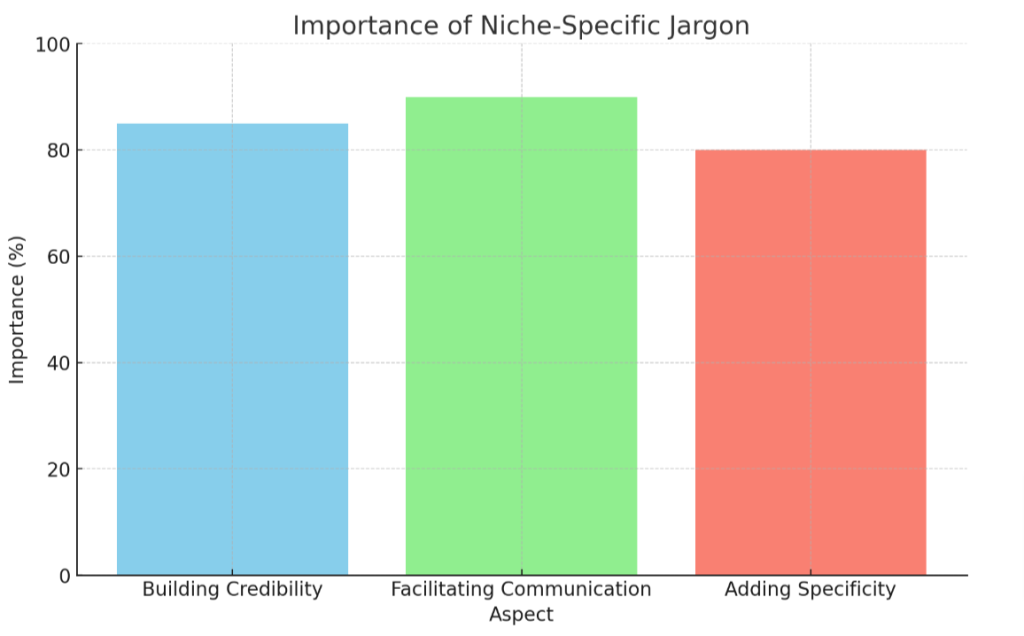Mastering Niche Jargon: Communicate Like an Insider
Are you finding it hard to navigate conversations in your chosen field due to unfamiliar terms and phrases? You’re not alone – many professionals struggle with understanding the unique jargon or lingo of their niche.
Through this blog post, we’ll demystify these industry-specific languages, helping you bridge the communication gap. Stay tuned; mastery over your niche’s language is closer than you think!
Key Takeaways
- Mastering the jargon of your niche is essential for establishing trust and credibility in your field.
- Using industry – specific language allows for efficient communication with peers and enhances understanding among colleagues.
- Utilizing niche terminology adds specificity to your message, making it easier for your audience to grasp complex ideas.
The Benefits of Using Jargon Appropriately
Using jargon appropriately in your niche has several benefits, such as establishing trust in your expertise, facilitating efficient communication with peers, and adding specificity to your message.
Establishes trust in your expertise
Grasping and correctly using niche-specific language showcases your proficiency in a particular field. This comprehension, paired with informed conversations users can follow, fosters credibility among colleagues and customers alike.
For instance, a tech professional adeptly breaking down complex programming principles using the field’s lingo is more likely to earn respect from peers. Similarly, existing or prospective clients witnessing this might gain confidence in that expert’s ability to solve their problems.
Expertise displayed through jargon usage plays an integral role in building trust. These steps aid in positioning you as a competent authority figure within your industry or niche market.
Efficient communication with peers
Understanding and deploying industry jargon appropriately allows for efficient communication with peers. It often takes less time to discuss complex ideas or processes when you can use a specific term that your colleagues already understand.
Imagine how lengthy the conversation would be if every specialized term needed an explanation!
Moreover, using niche-specific language demonstrates your deep knowledge of the field. Colleagues appreciate this, as it shows you are fully immersed in their shared world of expertise.
Recognizing and utilizing academic writing or market language common within your profession helps build strong professional relationships based on mutual respect and understanding.
Adds specificity to your message
Using niche-specific language in your message refines your communication. It allows you to convey complex ideas with precision and accuracy. Your audience quickly grasps what you’re saying because you’re using the exact terms that relate to their field or interest.
This unique lingo will streamline your messages, minimizing misinterpretation risks, and ensuring greater comprehension among industry peers. Moreover, tailored jargon can strengthen your content marketing efforts by resonating more deeply with the customer’s educational needs and interests within the specific discipline or market.
Therefore, mastering industry language not only aids effective communication but also enforces a sharper focus on target audiences’ distinct demands in academic writing or other niches.
The Harm of Using Jargon Ineffectively
Using jargon ineffectively can alienate non-experts, make you appear arrogant or elitist, and lead to misunderstandings.
Can alienate non-experts
Using jargon in your communication can unintentionally isolate and exclude non-experts. When you consistently use niche-specific vocabulary and technical terms, it may become difficult for those outside your field to fully understand what you are saying.
This can create a barrier between you and your audience, making them feel left out or excluded from the conversation. To ensure effective communication, it’s important to strike a balance between using industry terminology and explaining concepts in simpler, more accessible language.
By doing so, you can engage a wider audience and make your content more inclusive.
May come across as arrogant or elitist
Using too much jargon in your communication may give off an air of arrogance or elitism. When you use language that is unfamiliar to others, especially non-experts, it can make them feel excluded or inferior.
The purpose of effective communication is to connect and convey information clearly, so it’s important to be mindful of how your use of jargon might be perceived. Instead, strive for clarity by using plain language and explaining complex terms when necessary.
By doing so, you will foster better understanding and avoid alienating others in the process.
Can lead to misunderstandings
Using jargon ineffectively in your communication can often lead to misunderstandings. When you use specialized vocabulary or industry-specific terms without proper explanation or context, it can leave your audience feeling confused and excluded.
This can especially be a problem when interacting with non-experts or individuals outside of your niche. Misunderstandings may occur because they are unfamiliar with the jargon being used.
To ensure effective communication, it is important to be mindful of your audience and make an effort to define and explain any unfamiliar terms when necessary. By doing so, you can avoid potential confusion and foster better understanding among all parties involved.
How to Use Jargon Effectively
To use jargon effectively, understand your audience, define and explain when necessary, and enhance understanding with metaphors or visuals. Mastering industryspecific terms will improve communication within your niche.
Read more to learn how to communicate effectively in your field.
Know your audience
To use jargon effectively, it’s crucial to know your audience. Understanding who you’re communicating with will help you tailor your message to their level of expertise and familiarity with industry terms.
Take the time to research and analyze your audience’s background, knowledge, and interests. This knowledge will enable you to strike the right balance between using niche terminology that adds specificity to your message and explaining unfamiliar jargon when necessary.
By knowing your audience, you can enhance understanding and foster effective communication within your niche.
Define and explain jargon when necessary
Effective use of jargon requires clear definitions and explanations. This helps ensure that everyone involved in the conversation understands the terms being used. To make sure your jargon is understood, follow these steps:
- Provide concise definitions: Keep your definitions short and to the point. Avoid using complex language or technical terms that may further confuse your audience.
- Use examples: Illustrate the meaning of jargon by providing real-life examples or scenarios where the term is commonly used. This can help clarify its practical application.
- Offer analogies: Compare jargon to something more familiar to your audience. Analogies can bridge the gap between unfamiliar terminology and concepts they already understand.
- Incorporate visuals: Visual aids such as charts, diagrams, or infographics can enhance understanding of jargon by providing visual representations of complex ideas.
- Break down complex terms: If a piece of jargon consists of multiple components, break it down into its individual parts and explain each one separately before discussing how they fit together.
- Create a glossary: Maintain a glossary of industry-specific terms that are frequently used within your niche. Include this resource on your website or share it with colleagues to encourage consistent understanding and usage.
Use metaphors or visuals to enhance understanding
Metaphors and visuals are powerful tools for improving understanding when using jargon. By comparing complex concepts to something familiar, metaphors can make the information more relatable and easier to grasp.
Visuals, such as charts or diagrams, provide a visual representation of the information, making it easier for people to visualize and remember. These techniques help bridge the gap between technical language and everyday comprehension, allowing clearer communication within your niche.
So go ahead and paint a picture with words or use visual aids to enhance understanding of your jargon-filled content.
The Importance of Continuously Learning and Adapting to Niche Jargon
Continuously learning and adapting to niche jargon is crucial for staying up-to-date, improving communication within your field, and demonstrating a commitment to your profession.

Stay up-to-date and relevant
Staying up-to-date and relevant in your niche is essential for effective communication and professional growth. By continuously learning and adapting to the latest jargon, trends, and developments within your field, you can position yourself as an expert and gain the respect of your peers.
It also allows you to improve communication within your niche, ensuring that you are speaking the same language as others in your industry. Moreover, staying current demonstrates a commitment to your profession and shows that you are dedicated to providing the most accurate and valuable information to your audience.
Don’t miss out on opportunities for growth – keep learning, stay informed, and remain relevant in your niche.
Improve communication within your niche
To improve communication within your niche, it’s important to make sure you’re speaking the same language as your peers. This means using industry-specific terminology and jargon that is familiar to those in your field.
When everyone understands the same vocabulary, ideas can be communicated more efficiently and effectively. Additionally, using niche language demonstrates a deep understanding of your profession and helps establish credibility amongst fellow experts.
By continuously learning and adapting to niche jargon, you’ll not only stay up-to-date and relevant but also enhance your ability to connect with others in your field on a deeper level.
Demonstrates a commitment to your profession
Staying current with the jargon and terminology of your niche demonstrates your dedication to your profession. By actively learning and adapting to new industry-specific language, you show that you are invested in staying up-to-date and relevant.
This commitment not only enhances your own understanding but also improves communication within your field. Continuously expanding your knowledge of niche lingo showcases your passion for what you do and positions you as a respected professional in your industry.
Conclusion
Learning and mastering the jargon of your niche is crucial for effective communication in your field. By understanding and using industry-specific terms, you establish yourself as an expert and enhance your credibility.
Additionally, it allows you to communicate efficiently with peers and adds specificity to your message. So take the time to learn the language of your niche and reap the benefits it brings!

